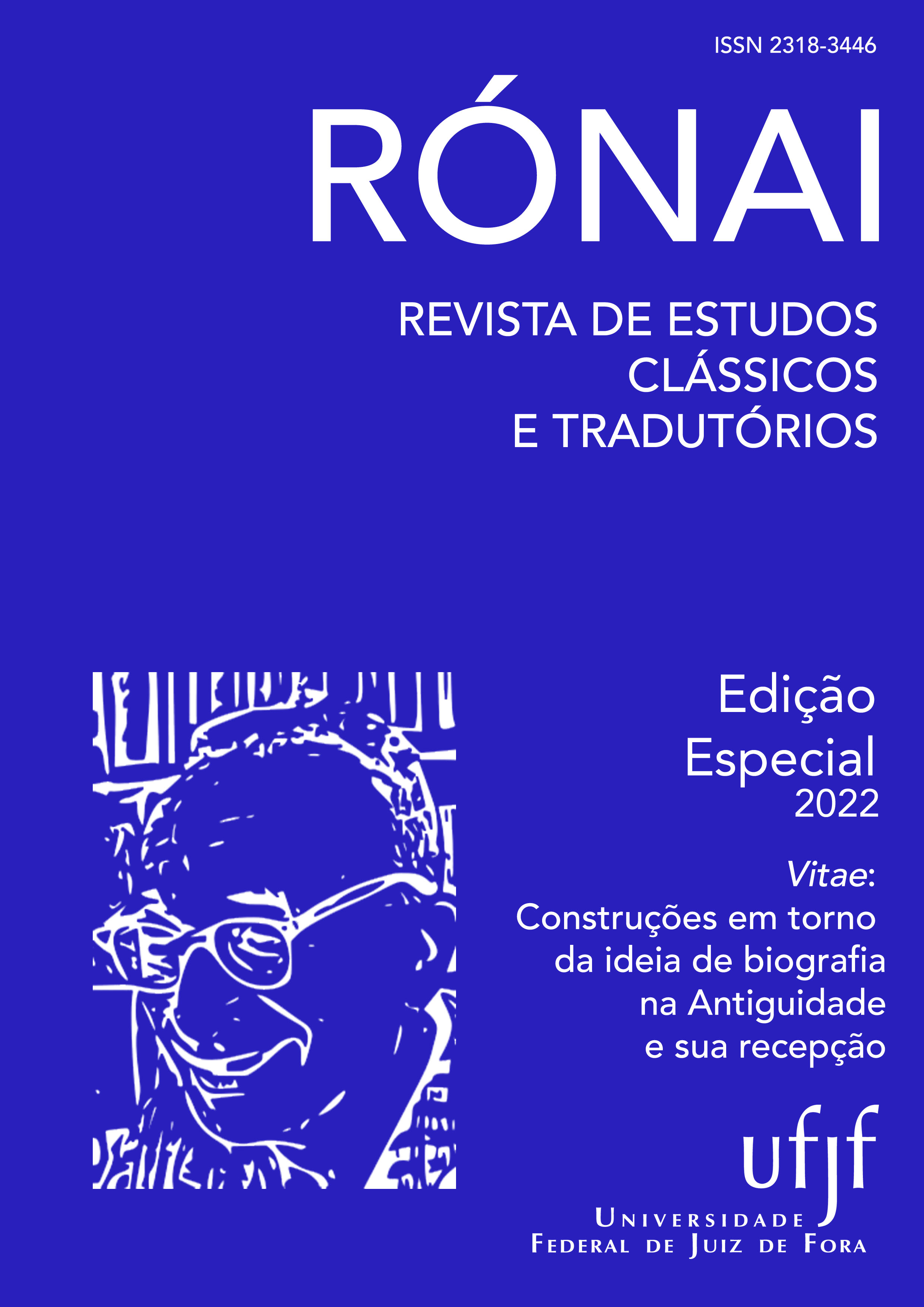Lives of Pindar
DOI:
https://doi.org/10.34019/2318-3446.2022.38442Palabras clave:
Vidas antigas, biografia, biografia grega, PíndaroResumen
This paper presents the translation of eight short texts on the life of the poet Pindar: a fragmentary Life, recovered from the Oxyrhynchus Papyri (P. Oxy. XXVI 2438); three Lives and a collection of sayings, transmitted as attachments to the medieval manuscripts of his works; and the three entries of the Suda that deal with Pindar and his direct relatives. By reading them together, we intend to highlight the variety of traditions, most often based on a biographical reading of his works, but also the persistence of certain stereotypical narrative themes, such as his privileged relationship with the gods, which culminates with Pan singing his songs in the vicinity of sacred mountains, and the gesture of Alexander, who would have spared his house when sacking Thebes.
Descargas
Citas
ADLER, Ada. (Ed.). Lexicographi Graeci. Vol. 1: Suidae Lexicon. Reimpressão fac-similar. Munique, Leipzig: K. G. Saur, 2001.
BEEKES, Robert. Etymological Dictionary of Greek. 2 vol. Leiden: Brill, 2010.
BOTERF, Nicholas; TARETTO, Erika. Pindar: a Guide to Selected Sources. Living Poets, Durham, 2015. Disponível em: < https://livingpoets.dur.ac.uk/w/Pindar:_A_Guide_to_Selected_Sources> Acessado em 14 de julho de 2022.
CADOUX, T. J. The Athenian Archons from Kreon to Hypsichides. The Journal of Hellenic Studies, v. 68, p. 70-123, 1948.
DAUDE, Cécile et al. Scholies à Pindare. Vol. I – Vies de Pindare et scholies à la première Olympique. Besançon: Institut des Sciences et Techniques de l´Antiquité, 2013.
DE MOURA, Camila. Vidas trágicas: Ésquilo, Sófocles e Eurípides no imaginário helenístico. Dissertação (Mestrado em Filosofia) – Programa de Pós-Graduação em Filosofia da Universidade Federal do Rio de Janeiro. Rio de Janeiro, 2019.
DICIONÁRIO GREGO-PORTUGUÊS (DGP). Coordenação de Daisi Malhadas, Maria Celeste Consolin Dezotti e Maria Helena de Moura Neves. Cotia: Ateliê Editorial, 2006.
DRACHMANN, Anders Björn. (Ed.). Scholia vetera in Pindari carmina. Vol. 1: Scholia in Olympionicas. Reimpressão fac-similar, Leipzig: Teubner, 1997.
FOUCAULT, Michel. Microfísica do poder. Rio de Janeiro: Graal, 1998.
HORNBLOWER, Simon; SPAWFORTH, Antony. (Ed). The Oxford Classical Dictionary. Oxford: Oxford University Press, 1999.
JACOBY, Felix et al. (Ed.). Die Fragmente der Griechischen Historiker Continued. IV A: Biography. Leiden: Brill, 2019.
KIMMEL-CLAUZET, Flore. Morts, tombeaux et cultes des poètes grecs. Bordeaux: Éditions Ausonius, 2013.
KIVILO, Maarit. Early Greek Poets’ Lives. The Shaping of the Tradition. Leiden: Brill, 2010.
LEFKOWITZ, Mary. The Lives of the Greek Poets. 2. ed. Baltimore: Johns Hopkins University Press, 2012.
LEFKOWITZ, Mary. The Poet as Hero: Fifth-Century Autobiography and Subsequent Biographical Fiction. The Classical Quarterly, v. 28, n. 2, p. 459-469, 1978.
LOBEL, E. (Ed.). The Oxyrhynchus Papyri, XXVI. London: Egypt Exploration Society, 1961.
MOMIGLIANO, Arnaldo. The Development of Greek Biography. Londres: Harvard University Press, 1993.
NAGY, Gregory. The Best of Achaeans. Concepts of the Hero in Archaic Greek Poetry. Edição revisada. Baltimore, Londres: The Johns Hopkins University Press, 1999.
NEUMANN-HARTMANN, Arlette. Pindar and His Commentator Eustathius of Tessalonica. In: CURRIE, B. et al. (Ed.). The Reception of Greek Lyric Poetry in the Ancient World: Transmission, Canonization and Paratext. Leiden: Brill, 2019. p. 533-552.
OLIVA NETO, João Ângelo. O hexâmetro datílico de Carlos Alberto Nunes: teoria e repercussões. Revista Letras, v. 89, p. 187-204, 2014.
RAGUSA, Giuliana. A tradição do paidikón na mélica grega arcaica: testemunhos e canções. Phaos, v. 17, n. 1, p. 187-212, 2017.
SAMUEL, Alan Edouard. Greek and Roman Chronology. Munique: C. H. Beck, 1972.
SMITH, William. Dictionary of Greek and Roman Antiquities. Vol. I. Londres: John Murray, 1890.
SMITH, William. (Ed.). Dictionary of Greek and Roman Geography. Vol I. Boston: Little Brown and Company, 1870.
SMITH, William. Dictionary of Greek and Roman Geography. Vol II. Boston: Little Brown and Company, 1872.
SNELL, B.; MAEHLER, H. (Ed.). Pindari Carmina cum Fragmentis. Pars II: Fragmenta. Leipzig: Teubner, 1989.
UREÑA PRIETO, Maria Helena et al. Índice de nomes próprios gregos e latinos. Lisboa: Fundação Calouste Gulbenkian, 1995a.
UREÑA PRIETO, Maria Helena et al. Do grego e do latim ao português. Lisboa: Fundação Calouste Gulbenkian, 1995b.
VERITY, Anthony. (Trad.). Pindar. The Complete Odes. Oxford: Oxford University Press, 2008.
WESTERMANN, Anton. (Ed.). ΒΙΟΓΡΑΦΟΙ. Vitarum scriptores Graeci minores. Reimpressão. Amsterdã: Hakkert, 1964.
Descargas
Publicado
Cómo citar
Número
Sección
Licencia
Derechos de autor 2022 Camila de Moura

Esta obra está bajo una licencia internacional Creative Commons Atribución 4.0.
Derechos de autor
Los autores que publican en esta revista aceptan los siguientes términos:
1. Los autores y las autoras conservan los derechos de autor y le otorgan a la revista el derecho a la primera publicación, que está bajo la licencia Creative Commons Attribution License 4.0 Internacional.
2. Los autores y las autoras pueden publicar y compartir el trabajo con reconocimiento de la publicación inicial en esta revista.
3. Los autores y las autoras de las obras aprobadas autorizan a la revista a asignar el contenido de sus obras, después de la publicación, para su reproducción en indexadores de contenido, bibliotecas virtuales y similares.
Para obtener más información sobre Creative Commons Attribution License 4.0 Internacional, acceda a: https://creativecommons.org/licenses/by/4.0/deed.es
Exención editorial
El contenido de los artículos publicados es responsabilidad única y exclusiva de sus autores, y no representa la posición oficial de Rónai - Revista de Estudos Clássicos e Tradutórios o de la Faculdade de Letras de la Universidad Federal de Juiz de Fora o instituciones asociadas.



